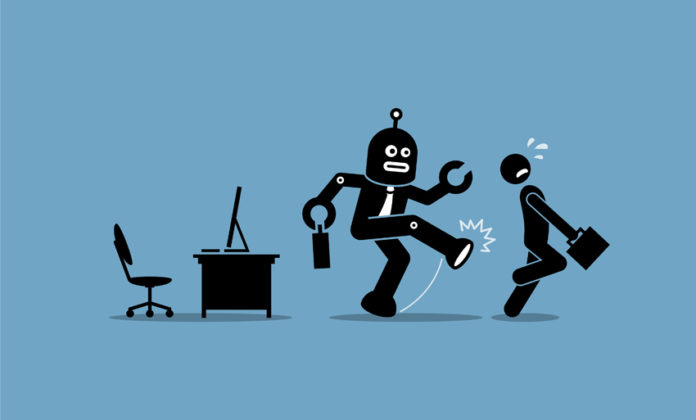Artificial Intelligence is all the rage in business right now, with companies clamoring to be at the front of the AI race. According to this analysis by Bloomberg, more and more organizations are mentioning AI on their earnings calls.
While the concept of AI is becoming a bigger part of business conversations, implementation is often stagnated due to misconceptions about the technology.
So, what are the most common misgivings about AI?
AI is Going to Replace All Jobs
Understandably, some people may feel that their jobs are at risk with AI-powered solutions. A machine that is precision-driven and has no need for benefits or personal development is surely an attractive option for businesses, right?
Actually, it’s not that simple.
A report from Paysa suggests automation jobs will put 10,000 people to work, and big companies will spend $650 million on annual salaries to make it happen.
So is there truth in the belief that AI based automation may strip hard working humans from their well-earned jobs? Not likely, according to current statistics. AI takes implementation, constant improvement, and quality assurance measures that can only be provided by good old-fashioned human workers.
Which leads us to the second of the AI myths:
AI Algorithms Will Make Sense of all Data Without Continuous Optimization
One of the most common concerns about AI is that with the help of machine learning, AI bots will be able to constantly improve their level of comprehension and development without the aid of humans.
Is this a valid concern?
ScienceDirect states that there are important meta-modeling analysis and interpretation activities associated with practical decision making when it comes to AI solutions. Simply put, AI models are not “set it and forget it” solutions. An autonomous bot can become a rogue liability if it’s not guided by a provider who can assure that a certain level of quality assurance is both measured and controlled.
While automation is the name of the game with AI, any integration of the technology should be able to be measured, managed, and re-configured when the needs arise.
AI Engines are Too Expensive and Too Complex for Non-AI Specialists to Implement on Their Websites
One of the constant challenges that companies are facing is that they feel their current talent pool will have difficulties in implementing and optimizing AI solutions. Another concern is that AI technology is expensive and may not provide an acceptable ROI.
AI Specialists can make millions over a four or five year period. That’s great for them, but what about companies that want to onboard AI technology without spending tons of cash for AI-abled candidates?
The good news is that companies may already have employees in-house that have the aptitude to learn the basic skills needed to monitor and improve AI programs. In fact, Google offers a free program that trains people in navigating AI systems.
And regarding the ROI? Cylance recently announced the results of their inaugural report, Artificial Intelligence in the Enterprise: The AI Race Is On, and found that according to their survey, which included insight from over 650 IT professionals, “optimism about the value of artificial intelligence (AI)-powered solutions in the enterprise is high and plans to continue investing in the technology are widespread.” In short, the outlook for positive ROI is good.
AI Can Mimic Human Emotion (Like Empathy)
The one advantage that humans have always had over automated solutions is their ability to provide Jungian-level emotional interactions. With the advance of machine learning, worry has mounted that AI-enabled bots will eventually be able to replicate human emotions.
No matter how smart automated machines may become, is it possible that they can equal or excel with genuine human conversations? While automated bots may be able to mimic human emotions, they cannot truly replicate the experience without feeling the emotions themselves.
The definition of empathy is “the ability to understand and share the feelings of another.” Empathy requires true human experience. While AI bots may be able to create the illusion of empathy, they will never be able to completely empathize with humans. Robots do not have feelings, and it is those feelings that can convert a banal conversation into a customer experience success story.
The Human Race Will Eventually be Enslaved to Robots
Before wrapping up, let’s talk about the mechanical elephant in the room. You don’t have to scan too far down your news feed to find a think piece about how humans are doomed to be taken over by the “Robopocalypse.”
It may sound like a far-fetched conspiracy theory but just in case, here are some helpful tips on how to survive a robot apocalypse:
- Wall Street Journal advises to “just close the door.” Apparently, in a government sponsored study, robots were stumped by a closed, unlocked door.
- Use giant magnets. Jeff Behl, Chief Network Architect at LogicMonitor and a veteran in the world of technical operations advises that we should consider using giant magnets to disrupt their hard drives.
- Always have a glass of water handy. As Assaf Baciu recommends in his guide on how to survive Elon Musk’s inevitable robo-domination: “electricity isn’t a fan of liquids”.
In Conclusion
While it’s been fun pontificating on how to stop an AI apocalypse, the truth remains that many of the myths surrounding Artificial Intelligence could prove to be detrimental for using the technology for what is actually is: an empowering innovation.
AI is not a plug and play be-all-end-all solution to personnel and quality assurance complications. Instead, it is an ever-developing aid. AI can be used to enhance and assist the hard-working and intelligent individuals that are necessary to deliver measure-driven results.
At the same time, when properly implemented it can save companies time, money and frustration.





